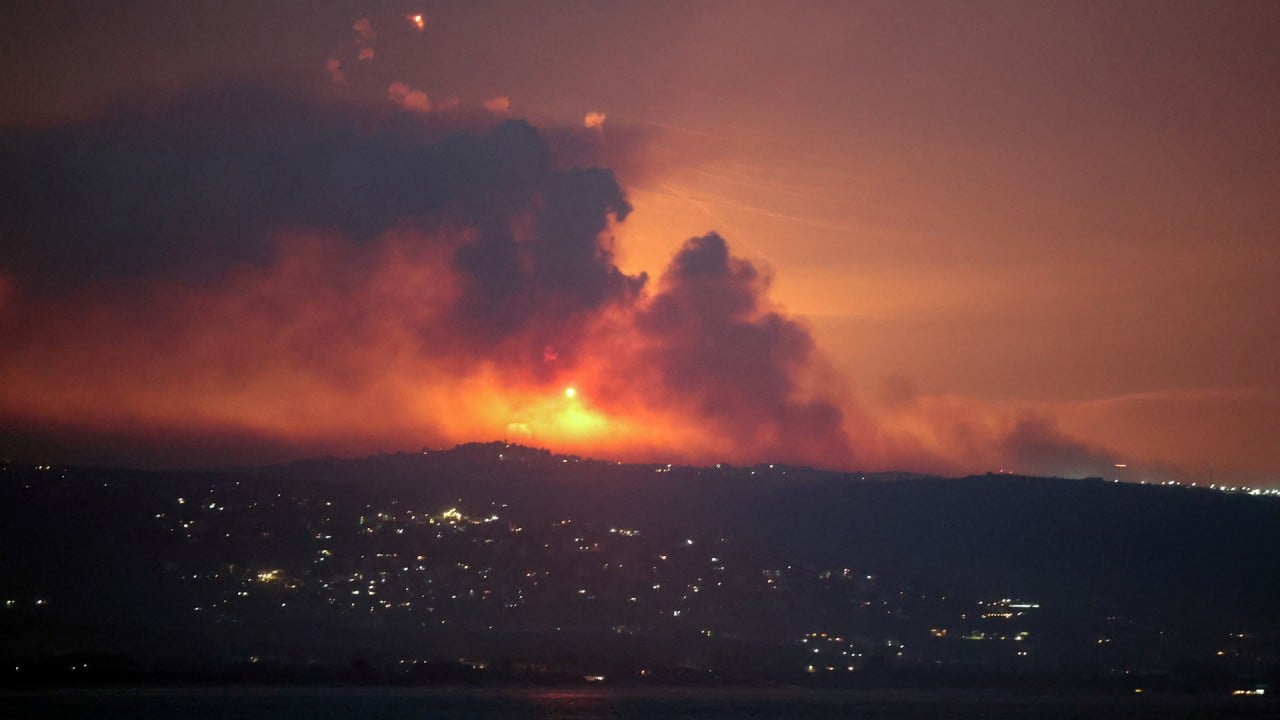As its soft power is increasingly challenged, the United States appears to be relying more on its hard power to uphold its vision of a rules-based international order. In contrast, China is establishing the socioeconomic and civilisational foundations of an equitable world order through its vision of a “community with a shared future”.
On Sunday, amid rising concern that a broader regional conflict is in the offing, Israel and Hezbollah engaged in their most intense cross-border strikes since the Gaza war began. Earlier, the US deployed warships and aircraft carriers to the Middle East to deter potential hostility with Iran.
Simultaneously, in the western Pacific, the US is working to contain what it sees as the threat from China through defence alliances and groupings. As the world’s sole superpower, it continues to maintain an extensive global military presence.
However, the US presidential election in November could disrupt this strategy. Republican presidential candidate and former US president Donald Trump seems keen to reduce American military commitments worldwide, leaving allies and partners such as Ukraine, Taiwan and the Philippines uncertain about their future security. Inconsistent global leadership from a deeply divided US could raise doubts about its reliability in defending the rules-based international order.
Despite internal divisions, the US maintains a unified stance on certain key issues, particularly the threat China poses to its global dominance. While Trump might avoid direct military confrontation, he is likely to pursue other strategies to contain China.
Another area of consensus is the conflict in Gaza; the outcome of November’s election is unlikely to alter the broad bipartisan support for Israel’s actions against Hamas. However, unflinching US support for Israel is gravely damaging its reputation.
Washington’s inability to broker a ceasefire in Gaza has undermined US global leadership in the eyes of some in the Global South. On Russia’s invasion of Ukraine, a politically divided US leaves it with an inconsistent stance, leading to greater unpredictability. Meanwhile, even a united US undermines its leadership by unwaveringly supporting Israel.
While US allies await the results of the November election to determine the future of their security strategies, the Global South is advancing its own initiatives. China has emerged as a key partner for these developing countries as they seek closer economic ties with Beijing. Additionally, a growing list of nations is seeking to join the China-backed Brics.
Chinese President Xi Jinping’s farsighted vision of a “community with a shared future for mankind” is shaping an emerging alternative world order. Central to this vision is the Global Development Initiative (GDI), with the Belt and Road Initiative as its cornerstone. Since its inception a decade ago, China’s belt and road strategy has invigorated economic growth in the Global South.
The West’s response to the Belt and Road Initiative includes efforts such as the US-led Build Back Better World announced at the G7 summit in 2021 and the European Union’s Global Gateway. However, these efforts have yet to make a comparable impact.
Their limited effectiveness is partly because of their apparent geoeconomic objective of containing China. In contrast, efforts such as the Belt and Road Initiative and Brics are viewed as tools for levelling the playing field. The GDI, in particular, is driving a shift in the global economic centre from the Global North to the Global South.
Another pillar of Xi’s vision is the Global Security Initiative (GSI), which underscores the critical role of global security in making the vision of a community of shared future for humankind a reality. As part of this vision, Beijing aims to transform the People’s Liberation Army into a world-class military force by 2049. This push for military modernisation could be viewed as a threat, especially in contested regions such as the western Pacific.
However, China does not seek to challenge or replace US-led global security architectures. The US remains the sole superpower with a global military strategy. Nonetheless, its worldwide military presence is increasingly difficult to sustain, which could be why Trump has advocated scaling it back.
The final pillar in Xi’s tripartite programme is the Global Civilisation Initiative (GCI), which underscores that trust between civilisations is essential for realising a community with a shared future for humankind.
The GCI is a direct challenge to two prominent Western world views.
The initiative offers a refutation of American political scientist Samuel Huntington’s argument of an inevitable “clash of civilisations”, instead asserting the possibility of coexistence where world religions and cultures collaborate for the common good. Contrary to another American political scientist Francis Fukuyama’s “end of history” thesis, the GCI argues that liberal democracy is not the pinnacle of human political progress but merely one of many pathways to achieving good governance.
At the end of the Cold War, Fukuyama’s thesis generated widespread enthusiasm and the world was captivated by the US’ message of liberty and democracy. However, the country has not consistently upheld these values and ideals. As its economic influence wanes, the US is relying on its military strength to maintain its global presence.
Meanwhile, in the Global South, China is laying the groundwork for a community with a shared future for humankind. The GSI plays a crucial role in facilitating a smooth transition to a new world order. However, it is the GDI and the GCI that have the greatest potential to create a more equitable and pluralistic global system.
True peace cannot be secured through military might alone. It requires the softer power of economic growth and mutual trust between civilisations to foster genuine security and stability.
Peter T.C. Chang is a research associate at the Institute of China Studies, University of Malaya, Kuala Lumpur, Malaysia



